- Home
- Todd Strasser
Price of Duty
Price of Duty Read online
Thank you for downloading this Simon & Schuster ebook.
* * *
Get a FREE ebook when you join our mailing list. Plus, get updates on new releases, deals, recommended reads, and more from Simon & Schuster. Click below to sign up and see terms and conditions.
CLICK HERE TO SIGN UP
Already a subscriber? Provide your email again so we can register this ebook and send you more of what you like to read. You will continue to receive exclusive offers in your inbox.
To the young men and women of the United States Armed Services.
“War does not determine who is right—only who is left.”
—BERTRAND RUSSELL
My thanks to David Gale, Petra Deistler-Kaufmann, Amanda Ramirez, and Stephen Barbara for their guidance, suggestions, support, and patience.
ALJAHIM
You are trained to be a soldier, not a hero. But sometimes the other thing happens.
BOOM! CRAUNK! Both sounds are unbelievably, painfully loud. Loud beyond imagining. Like your head being smashed between metal garbage can lids. So loud you can’t believe you’ll still have eardrums afterward. If you have time to believe anything. But you don’t. There’s no time.
A moment ago you were riding down a road in a Humvee. Now the vehicle’s lying on its roof forty feet off the road and you’re the only one left inside. Heavy munitions fire, screams, shouts, and explosions join the loud ringing in your ears. Metallic plangs ricocheting off the Humvee. Thudding pocks when rounds slam into the bulletproof windows. Inside the vehicle, you’re hanging upside down, restrained by your seat harness. Half a dozen burning points of pain are distributed around your body. Vision is a reddish blur. An IED headache has your brain in a death grip. Something warm is running up your cheek and into your right eye. It’s bright red.
Someone nearby is screaming, “I’m hit! I’m hit!” Someone farther away is shouting, “Where’s the triggerman? Find the triggerman!”
Bratta! Bratta! Bratta! Plang! Pock! Zang! Multiple weapons fire. It dawns on you that there is no one triggerman. There are dozens.
Boom! The Humvee is rocked by the blast of an RPG.
“Ahhh! Ahhhh!” More screams of pain.
Where are my buddies?
* * *
My eyepro’s gone. There’s nothing to protect my eyes from flying shrapnel and dirt. The reddish blur in my vision is blood. It’s coming from a piece of shrapnel lodged painfully under my chin cup. How it got there, I’ll never know. It’s one of a dozen pieces of shrapnel that the Army docs will eventually remove from my body.
But right now most of those shrapnel are just vague burning points of pain. Right now it’s all adrenaline, shock, shouts, and explosions. I’m upside down. Rollover training kicks in. Orient, establish three points of contact, brace, and release the seat harness. Egress. My gloved hand jerks the door handle, but the door won’t open. Wait, my head is closer to the ground than my feet are. In this position, you don’t push the door handle down. You pull it up.
An instant later I roll out into the heat, sunlight, and mayhem. Intense machine gun and small arms fire bashing my eardrums. Supersonic lead bees whizzing past. But the firefight is good news. Someone on our side must be shooting back. The hot air stinks of gasoline and sulfur. A fusillade of bullets rips into the ground, spraying grains of dirt into my face and mixing with the blood in my eyes. I’m in the kill zone, in what must be far ambush conditions. How do I know it’s not near ambush? Simple. If it was a near ambush, I’d be worm dirt by now.
More metallic bees whiz by. The closest ones cutting through the air inches from my head. I get prone, jam some QuikClot under my chin cup. Damn, that hurts, but it stops the bleeding. Blink the remaining blood out of my eyes and try to establish where the enemy fire is coming from. Glance around for cover. Where are my guys? Skitballs, Magnet, Clay? Remind myself that I’m in a mined area. I can’t stay exposed like this for long without getting hit. But where will the land mines be if I move?
These thoughts race through my head in a matter of milliseconds.
“Ahhhh! Ahhhh! I’m hit! Jake! I’m hit!” It’s Skitballs. He’s somewhere to my right, where a lot of enemy fire is coming from.
I have to go get him.
JAKE
The prop plane touches down. I can see the crowd through the window. They’re cheering, waving American flags—some small, some large. A handwritten bedsheet banner reads: WELCOME HOME, JAKE! OUR HERO!
A homemade cardboard sign taped to a broomstick: THANK YOU FOR SERVING OUR COUNTRY.
There must be two hundred people out there.
My heart beats harder. I’ve had weeks to prepare for this moment. Weeks to rehearse what to say and when to say it. Yes, I’m supposed to be a hero. I’ve been told that a thousand times since the ambush. Only I don’t feel like a hero. When it’s actually happening, you don’t know you’re being brave. You just do what you’ve been trained to do. What your instincts tell you to do.
You do it knowing there’s a good chance you’re going to die. You do it because you have to . . . if you hope to be able to live with yourself when it’s over.
The plane that’s brought me home to Franklin is provided by a company that collects donated miles and uses them to fly war heroes and wounded warriors around for “nonmilitary purposes.” As we taxi toward the terminal, I start to recognize faces—Dad, Lori, Aurora, and the General are out in front. I’ve seen them dozens of times on Skype over the past six months, but now, seeing them this close makes my heart ache. I’ve missed them. It’s going to be so good to be home.
The crowd can see me through the plane’s window. They’re waving, pumping their signs up and down, shouting words I can’t hear through the glass. Meanwhile, my heart is drumming, my body taut at condition orange. My hands don’t want to obey when I try to undo my seat belt. It’s safe inside this plane. I’m protected . . . and alone.
Come on, Jake, I tell myself. No one out there wants to hurt you.
This should be easy, right? Just go out there and see your family, your friends, and a couple hundred adoring neighbors. Instead, it’s as stressful as being in the lead Humvee of a convoy. As much as I’ve been looking forward to seeing everyone, I’ve been dreading this moment for weeks.
“Jake?” The pilot’s come out of the cockpit and is leaning on the seat in front of me. He has a ruddy face and a mustache. Gray sideburns poke out from beneath his pilot’s hat. With that frozen smile people wear when they’re trying to mask concern, he nods at the window. “They’re waiting for you.”
“Yessir.” I unbuckle the seat belt. Ironically, at moments like this, it’s military training that gets me to do that which I wasn’t sure I’d be able to do. My left leg juts out into the aisle because it’s in a cast from the top of my thigh to my foot. I grab a crutch with one hand, and the top of the seat in front of me with the other.
“Need help?” the pilot offers.
“No, sir. Thank you, sir.” I hoist myself up and position the crutches. Duck my head down the narrow aisle and turn out through the doorway. The crowd cheers, raises their banners, and waves flags. There’s everything short of a brass band. The sun is bright and I’m glad I’m wearing shades. It feels hot for early June. With the scent of honeysuckle in the air come memories of carefree days lounging by swimming pools, flirting with pretty girls.
If only I didn’t know now what I didn’t know then.
I start down the airstairs. At Landstuhl, they taught me how to do stairs with crutches and not fall on my face. The plane’s props have stopped turning and the cheering crowd surges forward. My body goes tense, on alert. You can tell yourself that these are family and friends, that this is secure and sheltered America, not a war-plagued foreign land filled with sniper
s and suicide bombers. But you can’t simply turn off training and experience. My eyes dart automatically, searching for the telltale metallic glint of a weapon, the unnatural bulge of a suicide vest under a shirt.
Halfway down the steps, my heart is racing. My body may have returned home, but my brain is still wired for war.
My family waits at the bottom of the airstairs. Lori and Aurora have tears in their eyes. They slide their arms inside the crutches, hug and kiss me. I’m enveloped in the different scents of their perfumes. My heart swells. It feels safe to be with them. They try not to stare at the jagged scar on my chin. They’ve seen it before on Skype, but here it is for real.
Dad pulls me close. “It’s great to have you home.” He seems to be blinking back tears.
The General gives me a bone-crushing handshake and claps a hand on my shoulder. “Congratulations, son. We’re proud of you. You’re a tremendous credit to our family.”
Aurora keeps her arm around my waist and nestles close. The fragrance of her light brown hair delights my nostrils. I’m so glad to see her, so filled with gratitude that she waited for me. Plenty of guys had girlfriends who didn’t. But she wrote letters and sent candy and thumb drives with movies on them. And she was almost always there when I wanted to Skype. What I’ve been through was bad, but it would have been so much worse without her.
* * *
This is the last stop on the “hero tour.” My right wrist is sore from all the hands I’ve had to shake. I’ve learned to keep my left hand low at my side and in a loose fist. That way the damage is less noticeable. But my sister, Lori, knows what happened and reaches for it.
“Not here,” I whisper.
The rest of the crowd presses in. My body stiffens. I’ve been on anti-anxiety meds for weeks. Otherwise, I might be doing a combat roll right now. But even with the pills, I’m still wound tight like a spring.
Up till now, I’ve always had a minder who’s helped control the crowds. But not here. It’s too loud, disorderly, and chaotic. Family friends want me to come to dinner. A TV crew wants me to give an interview. Strangers congratulate me on my bravery and thank me for my service. I can’t keep track of who’s touching, patting, grasping. There’s no order, no space, no room to breathe.
Aurora slides between me and the crowd. She must feel the tension in my body, the tightness with which I clutch her waist. She tugs at Dad’s sleeve, stretches up on her toes, and whispers in his ear.
Dad’s forehead bunches, and he turns to the crowd. “Okay, everyone, thanks for being here. Jake’s delighted that you’ve all come out to welcome him. But let’s give him some room, okay? It’s been a long trip and he’s tired. He’ll be home all week and I’m sure he’ll make time to see all of you, but right now he needs to get—”
“Now, just a minute!” the General gruffly interrupts. “These people have given up part of their day to come out and stand here in the hot sun. The least they deserve is a few words from our conquering hero.”
Damn!
* * *
What is a hero? I’d say that it’s just about anyone who ever served in the military. Probably anyone who’s ever gone to war. Definitely anyone who’s spent more than a day at Forward Operating Base Choke Point, running for the bunkers every time the warning siren wailed and soldiers shouted, “Incoming!”
“Ahhhhhhhhhhh!” In the dusty dimness, my buddy Skitballs hugged his knees and let out a shriek that made us all jump. With the sirens blaring, we’d all just dived into this bunker. Skitballs—Jayden Skinner, dark-skinned, tall, lanky—was the last guy in. He’d barely gotten here when the first missile blast slammed the reinforced door shut behind him. Had he been a second slower, there’d probably only be bits and pieces of him now.
“Y’all okay, Skits?” Morpiss asked in the near dark.
The stream of curses Skitballs unleashed were strangely reassuring. It sounded more like the grunt we knew, the dude who signed up so he could pay off his girlfriend’s credit card debt with the enlistment bonus. We waited while he calmed down, taking deep breaths, his fists clenching and unclenching. “Goddamn!” he groaned. “What kind of psycho bat whack is this? Incoming day and night. Can’t sleep. Can’t think straight. Am I the only one here going crazy?”
We all were. Skitballs was just the first to say it out loud.
“Go see the doc. He’ll give you something,” a voice came from the shadows deeper in the bunker. From an older, grizzled, sunbaked guy wearing corporal stripes. Looked too old to be a noncommissioned officer. But they said life in a war zone aged you in dog years.
“Give me something?” Skitballs asked. “Like what?”
He’d soon find out. We all would.
* * *
Retired Major General Windborne (Windy) Granger is my grandfather, my mother’s father, and a famous war hero. Around Franklin they call him the General, and he still expects everyone to follow his orders. For the most part, they do.
Standing in the hot sun on the airport tarmac, the crowd grows quiet. One of the stupidest things I ever read was about how some people fear public speaking more than death. Anyone who believes that hasn’t come within a thousand yards of a lead slug traveling 1,700 miles per hour straight for your face. Give a soldier a choice between standing before a crowd of a hundred thousand and telling them about the five most embarrassing things that ever happened to him, or being in a Humvee rolling over an IED—improvised explosive device—loaded with eighty pounds of potassium chlorate? I guarantee you he’ll gladly tell the whole crowd about that time his sister walked into the bathroom while he was busy getting to know Mary Five-Fingers.
With the General beside me, I give the crowd what he wants: “Thank you all for coming out to greet me. I feel honored that you took the time. I hope you’ve seen on TV or the internet, me saying how proud I am to be from Franklin, where people have big hearts and strong values. It’s really good to be home.”
The crowd cheers until the General raises a hand and quiets them so he can also thank them for coming out (and remind them that he’s the hero’s grandfather). Then it’s over. Dad takes my arm and guides me toward the General’s big black Mercedes. Not many people around Franklin would be allowed to bring their cars onto the airport runway, but guess which famous retired general can?
Before we get to the car, Sam Washington plants himself in front of me. He’s wearing his Junior Reserve Officers Training Corps instructor uniform with all the fruit salad. He’s a Gulf War vet and was my JROTC instructor at Franklin High. Probably around fifty years old and still in top military shape. He pulls me into a bear hug, crutches and all. With his lips close to my ear, he whispers, “You okay, son?”
Here’s how I wish I could answer: by telling him to go to hell.
Here’s how I do answer: “Yessir.”
Sam lets me out of the hug but holds me at arm’s length. “So you’ll come speak to the class tomorrow,” he says loud enough for those around us to hear. “They all want to hear your story.”
What story will I tell them?
He lets go, but there’s someone behind him. She’s wearing a baggy gray athletic T and cutoffs, and her brown hair is gathered up in a loose bun of dreadlocks spreading out like octopus tentacles. “Hi, I’m Brandi,” she says with a bright smile. Her gray-green eyes are piercing. “I’ve been texting you? You haven’t answered, probably because you get so many.”
Near us, the General makes no attempt to hide his glower. Is he offended that she’s dressed so informally (in his mind: disrespectfully) for this event? Or is the explanation both simpler and uglier: that she’s not the “correct” color?
“I’m from the Franklin Frontier,” Brandi goes on, undeterred. “I know you’ve already given, like, a thousand interviews, but it would be so great if you’d give one to your former high school.”
“I’m sorry, miss,” the General harrumphs. “Jake’s just come an awful long way. Now isn’t the—”
“Oh, I didn’t mean now.” When Brandi
cuts him short, my grandfather’s eyes narrow and his jaw goes tight. Interrupting is something you just don’t do to the General. The funny thing is, I get the feeling she knows this. Or at least senses it. And she cut in anyway.
“Maybe tomorrow?” Brandi says. “At school? After the JROTC class?”
“Sure,” I tell her, pretending not to notice my grandfather’s frown.
The General’s driver holds the Mercedes’s door open. A driver and car is one of the retirement perks some generals get. Now that I’ve gotten this close to Aurora, I hate to leave her again. But she understands. I give her a kiss and tell her I’ll see her later. Inside the car, I have to ride in front because that’s the only seat with enough legroom for my cast. Lori, Dad, and the General sit in the back.
When the Mercedes starts to move, my hands automatically slide toward my chest before I catch myself and place them in my lap. It’s just muscle memory. The first time I rode in a Humvee with Brad, he told me to keep my hands inside my armor. I slid them through the arm holes, where they naturally landed on my pecs. I sat that way for a while, but my hands began to get hot and it felt weird to have them over my pecs anyway. So I took them out. Brad’s eyes slid in my direction. I could see he disapproved.
About a month later a suicide bomber in an old car loaded with explosives rammed a Humvee just outside the wire and blew the guys inside to smithereens. Romeo Squad was on security detail that day, and Brad lined us up for casualty collection. His eyes went right past me, then stopped and returned as if he’d remembered something. “And especially you, Liddell. Go out and find the pieces. All of them.”
He wasn’t talking about pieces of the Humvee.
It was probably one of the worst things I ever had to do. One of the many chores you won’t see in any Army recruiting commercial. Morpiss and I puked. A couple of other guys couldn’t even do it. And, of course, as if Brad had known, there was a hand.

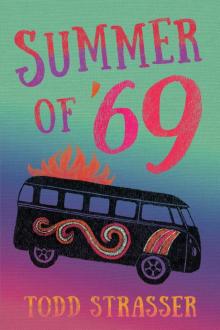 Summer of '69
Summer of '69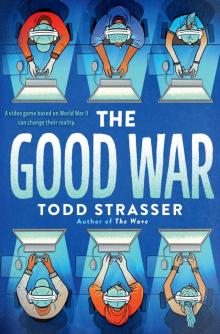 The Good War
The Good War Famous
Famous If I Grow Up
If I Grow Up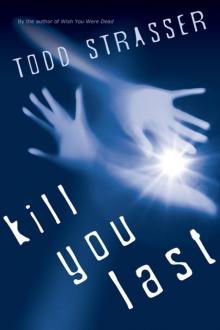 Kill You Last
Kill You Last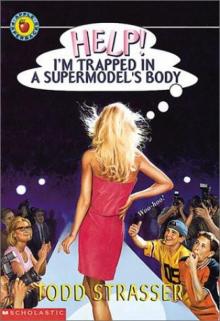 Help! I'm Trapped in a Supermodel's Body
Help! I'm Trapped in a Supermodel's Body Price of Duty
Price of Duty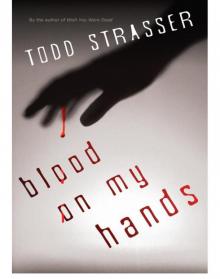 Blood on My Hands
Blood on My Hands Help! I'm Trapped in My Sister's Body
Help! I'm Trapped in My Sister's Body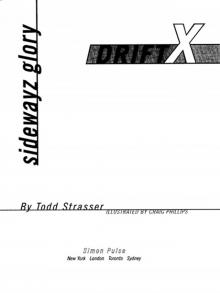 sidewayz glory
sidewayz glory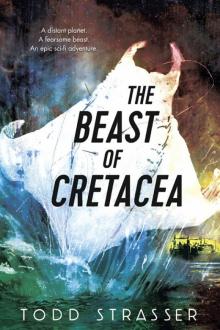 The Beast of Cretacea
The Beast of Cretacea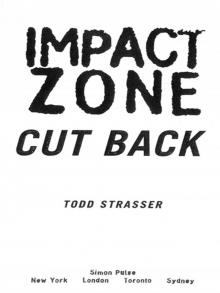 Cut Back
Cut Back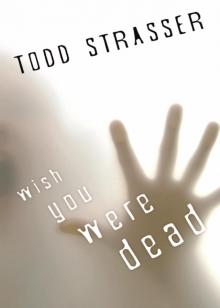 Wish You Were Dead
Wish You Were Dead The Wave
The Wave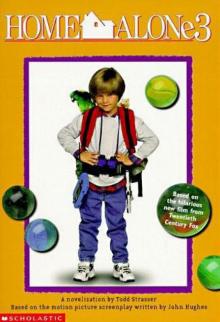 Home Alone 3
Home Alone 3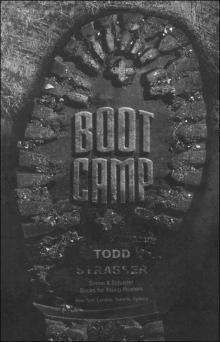 Boot Camp
Boot Camp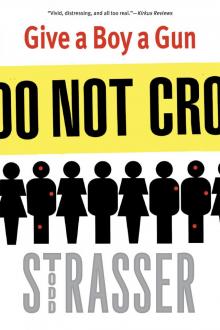 Give a Boy a Gun
Give a Boy a Gun Home Alone 2
Home Alone 2 The Shore
The Shore Can't Get There from Here
Can't Get There from Here Home Alone
Home Alone Close Out
Close Out No Place
No Place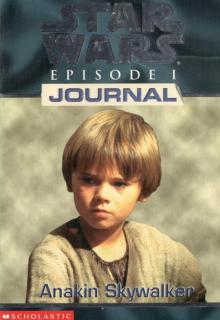 Star Wars - Episode I Journal - Anakin Skywalker
Star Wars - Episode I Journal - Anakin Skywalker